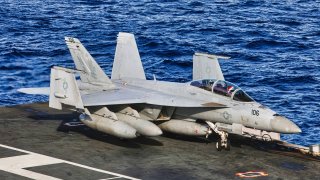Can the F/A-18 Super Hornet Survive in the Stealth World?
While the F/A-18 Super Hornet may not feature the same stealth characteristics of the F-35 and F-22, the platform is still significant and would play a role in potential future conflict over the Indo-Pacific.
The American-made F-35 Lightning II and F-22 Raptor fighter jets are considered by most to represent the pinnacle of aerial innovation. These fifth-generation powerhouses outperform their peers in nearly every arena. However, America’s once-claimed air superiority is now challenged by China and Russia.
Both of these U.S. adversaries possess their own fifth-generation airframes: the Chengdu J-20 and the Su-57, respectively. If a full-blown war in the Pacific were to unfold, the Raptor and Lightning II would certainly play a leading role in any American air strategy. And while they may not be stealth aircraft, the U.S. Navy’s older F/A-18 Super Hornet platform would also be called to action in such a conflict.
This tried and trusted fighter has served the Navy for nearly four decades and has evolved over time in order to retain an edge over competing platforms.
During the Cold War, the initial Block I “Hornet” jet was conceptualized. Manufacturers McDonnell Douglas and Northrop Grumman constructed the F/A-18 platform to feature enhanced avionics, cockpit displays, and overall versatility. Based on the platform’s proven technology, Boeing rolled out the Super Hornet variant of the F/A-18 in the early 2000s. Today, each of the Navy’s strike fighter squadrons has transitioned to the Super Hornet.
Introducing F/A-18 Super Hornet Block III
The latest Super Hornet variant to become operational is Block III. With this incredible upgrade, the already mighty platform is even more lethal. According to Boeing, the latest Super Hornet model exceeds fourth-generation fighter capabilities, as its “new adjunct processor translates to a fighter that will do more work and in far less time, increasing a pilot’s situational awareness.” The new Block III cockpit is fitted with the Advanced Cockpit System, featuring a sophisticated touchscreen which gives the pilot a clearer vision of the battlespace.
Block IIIs are also able to carry more fuel than earlier variants and can clock up to 10,000 flight hours over their service lives.
Perhaps most significant is the Block III’s smaller radar cross-section. This feature helps minimize the fighter’s detectability and makes it harder for adversarial aircraft to locate and intercept it. So, while the new Super Hornets may not be technically stealth aircraft like the F-22 or F-35, they would still be useful weapons if a full-blown war were to erupt.
Ordinance power
Ordnance-wise, the Super Hornet can pack a punch. The F/A-18E/F can lug nearly 17,800 pounds of weapons, including AIM-120 Advanced Medium Range Air-to-Air Missiles (AMRAAMs), AIM-9X Sidewinder missiles, Joint Direct Attack Munition (JDAM) and Laser JDAM, conventional and laser-guided bombs, and Harpoon anti-ship missiles.
In recent years, the Navy has been incorporating emerging technologies and weapons into the Super Hornet to make it more effective in a fifth-generation air space.
This summer, the Block IIIs were loaded with the new AGM-158C LRASM long-range anti-ship missiles. “We have continued to invest in the design and development of LRASM’s anti-surface warfare capabilities to ensure that warfighters have the 21st century security solutions they need to complete their missions and come home safely,” said the program’s director.
While the Super Hornet may not feature the same stealth characteristics as the F-35 and F-22, the platform is still significant and would play a role in potential future conflict over the Indo-Pacific.
About the Author: Maya Carlin
Maya Carlin, National Security Writer with The National Interest, is an analyst with the Center for Security Policy and a former Anna Sobol Levy Fellow at IDC Herzliya in Israel. She has by-lines in many publications, including The National Interest, Jerusalem Post, and Times of Israel. You can follow her on Twitter: @MayaCarlin. Carlin has over 1,000 articles published over the last several years on various defense issues.
Image Credit: Creative Commons and/or Shutterstock
From the Vault
F-35I Adir: Israel Has a Special Stealth Fighter Even America Doesn’t Fly

